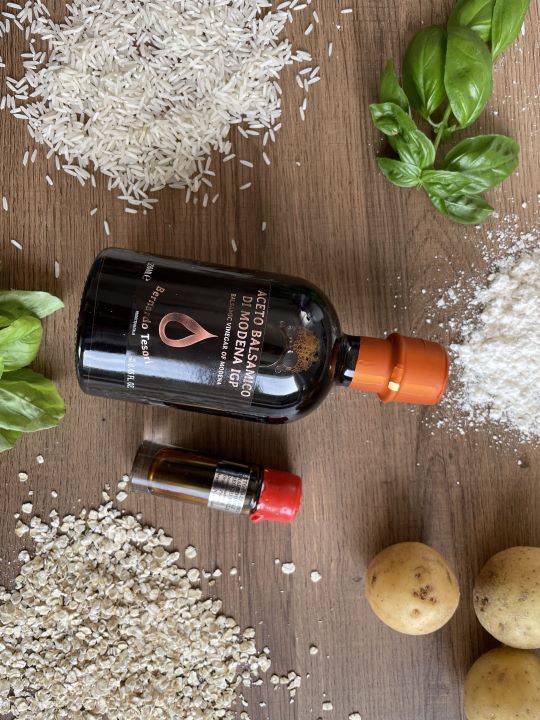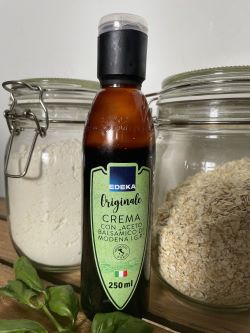If you experience abdominal pain, nausea and indigestion after eating a slice of bread or a slice of pizza, you may be sensitive to gluten, have a gluten intolerance or even suffer from the autoimmune disease celiac. From now on it is time to be careful what you eat. Spices often contain hidden sources of gluten. We present you the balsamic vinegars which you can be sure are gluten-free.

In the case of gluten intolerance the body reacts to the gluten protein. It cannot be broken down in the small intestine, causing the intestine to become inflamed. In the case of celiac disease, the body reacts to even the smallest traces of gluten, which means that spices and other seasonings, which are often used in small quantities, can also have an effect. This is where balsamic vinegar can help.
Which balsamic vinegar is gluten-free?
The Italian Celiac Association has studied the various types of balsamic vinegar and found out what people with coeliac condition should look out for and which balsamic vinegar is gluten-free. To do this, the association looked at the product specifications for each balsamic vinegar. The specifications contain strict rules that the balsamic vinegar producer must follow in order to carry the designations IGP and DOP. The observance of these rules is guaranteed by a special control body: the Consorzio. After analysing these product specifications, the coeliac association of Italy stated the following:
"Neither the ingredients nor the production method present a risk for the presence of gluten. As soon as a balsamic vinegar contains the designation "Aceto Balsamico di Modena IGP" as well as "Aceto Balsamico Tradizionale di Modena DOP" or "Aceto Balsamico Tradizionale di Reggio Emilia DOP", the vinegar is 100% gluten-free and can be consumed without hesitation by people with a gluten intolerance".
If the protected designation of origin is missing, the Italian Celiac Association still considers the balsamic vinegar to be gluten-free if it is simply made from cooked grape must, wine vinegar and natural sulphites. The National Celiac Association of the United States (NCA) confirms this result. Although they have not dealt with the product specifics, they state, that balsamic vinegars in general are gluten-free. Balsamico can therefore be consumed without hesitation by those affected.
Be careful with flavored vinegar and balsamic glaze

However you should take a look at the list of ingredients for flavoured vinegars. According to the NCA a flavored vinegar may contain malt as an ingredient, which means that the vinegar is no longer gluten-free.
According to the German Celiac Society (DZG), people with gluten intolerance and coeliac disease should also be careful with balsamic glaze, also called balsamic cream. This is because additives such as thickeners and sugar are often added to balsamic glaze to create a sweet and thick consistency. The sugar is harmless, but depending on the thickener used, the balsamic glaze is no longer gluten-free. Particular care should be taken with modified starch, which can be derived from cereals such as wheat, making the balsamic glaze gluten-containing.
A genuine Aceto Balsamico Tradizionale that has been allowed to mature long enough (12 years or more) is at least as sweet and viscous as a balsamic glaze but it is also much more intense and varied in flavour. Therefore it is a perfect alternative not only for balsamic glaze but also for flavored balsamic vinegar.
Conclusion: Whether a balsamic vinegar is gluten-free or not depends on the product name
To sum up, we can say that a gluten intolerance or even a coeliac condition is no obstacle when it comes to seasoning with a balsamic vinegar. What matters is the correct product name of the balsamic vinegar. If you want to save yourself the trouble of checking the ingredients list, simply choose a product with the IGP/PGI or DOP/PDO label. Here you can be 100% sure that the balsamic vinegar is gluten-free.
The situation is different with balsamic glaze. It could contain hidden gluten in the form of modified starch. However, you do not have to give up anything. If you want to use a thick, sweet balsamic vinegar, simply use an Aceto Balsamico Tradizionale.


Cooking with Traditional Balsamic Vinegar
Meesha Halm, 96 pages
$ (EN) 18,90
Order today!